
Chancellor Rachel Reeves' flagship plan to slash VAT on electricity bills is facing mounting criticism from energy analysts and economists who warn the measure could backfire spectacularly.
Short-Term Relief, Long-Term Pain
The proposed 5% VAT reduction, intended to provide relief to households struggling with energy costs, may inadvertently fuel inflation and fail to reach those most vulnerable, according to fresh analysis.
Experts from leading energy consultancies suggest that while consumers might see immediate savings, the policy could trigger a chain reaction of negative economic consequences that outweigh any temporary benefits.
Inflationary Fears Mount
The most significant concern centres on inflation. Analysts warn that putting more money into consumers' pockets through lower bills could increase spending power, potentially driving up prices elsewhere in the economy.
This comes at a particularly sensitive time when the Bank of England remains focused on bringing inflation back to its 2% target. Any policy that risks undermining this effort could force the Bank to maintain higher interest rates for longer.
Targeting Problems Emerge
Another major criticism revolves around the policy's blunt approach. Unlike targeted support measures, a blanket VAT cut benefits all electricity users regardless of their financial situation.
"Wealthier households who consume more electricity would receive the largest absolute savings," one analyst noted, "while those genuinely struggling might see minimal relief."
Industry Voices Concerns
Energy sector professionals have expressed scepticism about the policy's design. Several pointed to existing support mechanisms that could deliver help more efficiently to those in genuine need.
The consensus among critics suggests that while the political appeal of a VAT cut is clear, the economic reality may prove far more complicated than anticipated.
As the debate intensifies, all eyes will be on how the government responds to these growing concerns about a policy that promised relief but may deliver unexpected consequences.





